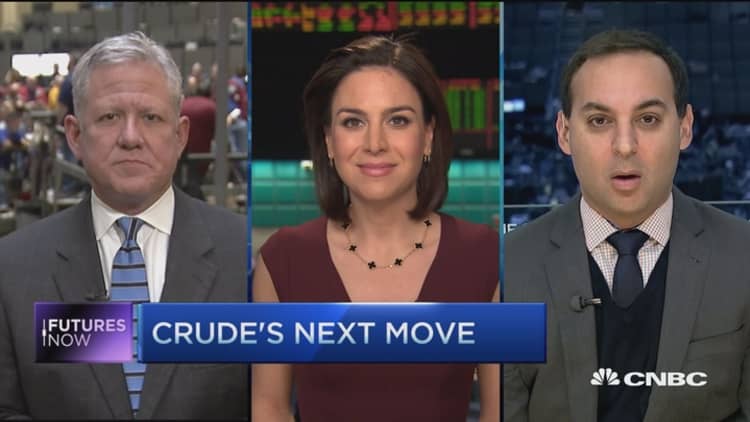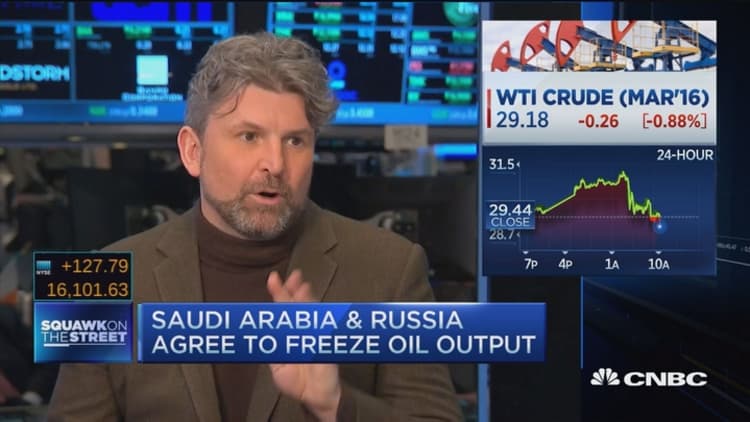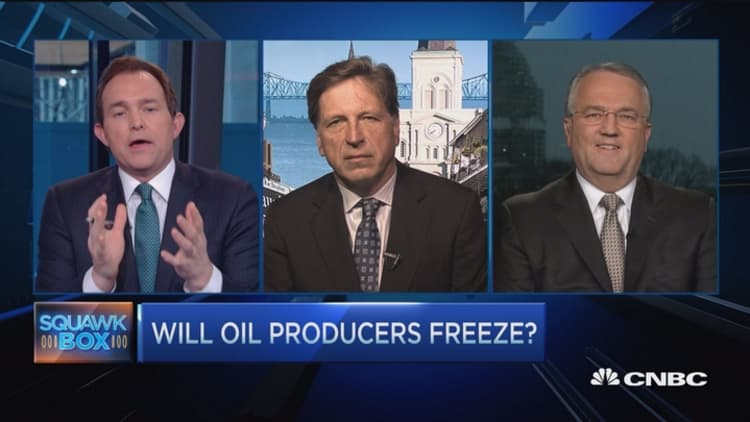


U.S. oil fell more than 1 percent on Monday, erasing early gains after top producers Russia and Saudi Arabia dashed expectations of an outright supply cut by agreeing only to freeze output if other big exporters joined them.
U.S. crude futures settled 40 cents lower, or 1.36 percent, at $29.04 a barrel, after hitting a high of $31.53.
Benchmark Brent prices jumped briefly through $35 a barrel after Russia and Saudi Arabia agreed to keep output at January levels, in what could be the first joint OPEC and non-OPEC deal in 15 years.
Qatari energy minister Mohammad bin Saleh al-Sada said the step would help to stabilize the oil market, which has experienced price declines not seen since the early 2000s because of a supply glut.
But buying quickly ran out of steam as investors weighed the chances of the agreement being sealed, with Iran absent from the talks and determined to raise production.
"A production freeze dependent upon the involvement of Iran seems a bridge too far at this juncture," said Matt Smith, director of commodity research at New York-based ClipperData, an energy data provider.
While the decision was a move toward bringing supply and demand into balance, analysts also cautioned that global inventories remain near record levels and are likely to dampen any price rallies.
"I'm adding to the short positions I have in U.S. crude spreads as I only expect price declines from here," said Tariq Zahir at New York's Tyche Capital Advisors. "The output freeze will do nothing to alleviate excess supply."
Brent crude futures were down 33 cents at $32.25 a barrel, having fallen from an earlier peak of $35.55, the highest price since Feb. 4.
Inventories at the Cushing, Oklahoma delivery point for U.S. crude futures rose by nearly 705,000 barrels during the week to Feb. 12, traders said, citing data issued by market intelligence firm Genscape.
Oil prices have fallen by more than 70 percent in the past 20 months, driven lower by near-record production both from the Organization of the Petroleum Exporting Countries and other producers, such as Russia.
But analysts also cautioned of violent price spikes and market volatility in coming weeks should there be indications of serious production or stockpile declines.
On Friday, both Brent and U.S. prices jumped about 12 percent each, rocketing from 12-year lows, on renewed speculation that OPEC might cut output.
Sources familiar with Iranian thinking on supply said Tehran would be willing to consider a freeze once its output had reached pre-sanctions levels.
"We have not yet reached our level of pre-sanctions production. So when we get there, we will be on an equal level, then we can talk," a senior source familiar with Iran's thinking told Reuters.
Iran will not give up its appropriate share of the global oil market, the Iranian oil minister, Bijan Zanganeh, was quoted by his ministry's news agency as saying on Tuesday.
Iran could be offered special terms under a global deal to freeze oil production levels, two sources familiar with the matter said on Tuesday.
"The output freeze is disappointing because it's not an outright cut and with Iran not a part of the meeting it's still a bit far-fetched to think this is a precursor to a future cut. Iran's absence from the meeting means overall OPEC output should still rise," CMC Markets analyst Jasper Lawler said in a note.
The oil ministers of Venezuela, Iraq and Iran will meet in Tehran on Wednesday to discuss an agreement to freeze producers' output at January levels, Venezuela's oil minister said on Tuesday.
Iraq is ready to commit to freezing its oil production at January levels if a deal is reached among OPEC and non-OPEC countries, an Iraqi oil ministry source said on Tuesday.
Azerbaijan has no plans to freeze its oil production, Azeri Deputy Oil Minister Natiq Abbasov told Reuters on Tuesday.
— CNBC's Tom DiChristopher contributed to this story.




